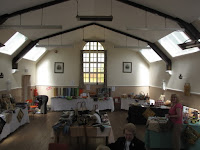It has become a bit of an annual tradition during Remembrance Day that I take
the time to research ancestors that served in wars. Today I focused on the Maxwell family.
 |
| David Maxwell |
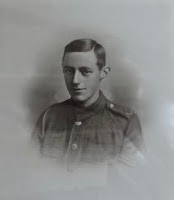 |
| John Rennie Maxwell |
Among my ancestors who died in WWI were
cousins of my grand-mother Isobel Maxwell: John and David Maxwell. She wrote once that she was very fond of both
of them. They were the sons of David Maxwell
Sr., a farmer in Ballindarg, Scotland (and Isobel's uncle). His
first wife, Jane Rennie, died when their sons were just ten and eleven
years old. Thereafter David Sr., was solely
responsible for their upbringing (he married his second wife much later). In
their memory, I offer a little of their story as soldiers of the Great War.
Forfarshire reportedly was hard hit by the
muster in 1914, with businesses, farms and factories losing many young men in
the service of the war. Local residents
were asked for patience as public and private services and industries adapted
to the depletion of employees. By 1918,
there was widespread concern that the losses the area had suffered was having
an impact on its ability to produce food and goods to support the population. Local newspapers reported that 75 per cent of
the young men were called up from Forfarshire, where in other counties the
numbers were closer to 44 per cent.
John “Jack” Rennie Maxwell
John Rennie Maxwell was known as Jack to
his friends. He and his brother David
both helped their father in his potato farming and mercantile businesses. John’s cousin Isobel was supposed to have resembled
him somewhat, and John had previously worked with his uncle, Isobel’s father,
at the Commercial Bank. I wrote about Jack’s
Gallipoli experience a few years ago.
Details of the battle which killed Jack are outlined in that blog post.
Jack joined the Fife and Forfar yeomanry with
his brother David at the age of 20 prior to the mobilization. As
part of the Royal Scots Regiment, 11th Battalion, he is remembered
for his gallantry and bravery, which won him a Military Medal. By the time he went into action in the
Gallipoli Campaign, he was a Corporal.
He sadly didn’t last long, killed with two others on October 18, not even a
month after their landing in Egypt on September 26, 1915.
The Forfar Dispatch November 11, 1915
reports the death of Corporal John Maxwell of Fife and Forfar Yeomanry in the
Dardanelles:
This news has caused wide-spread regret not
only on account of the sympathy which is felt for the bereaved parents but also
on account of the fact that Corporal Maxwell was well-known and a general
favourite on account of his bright, friendly and humoursome ways. He has laid down his life at the call of duty
when life is most alluring and he has paid his share of the heavy price by
which we are purchasing for the world freedom and peace.
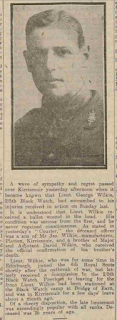 |
| GSM Wilkie |
On November 26, 1915, Kerriemuir’s Parish
Church held a service to honour the fallen of the parish. It was a well-attended service which included
local elected officials, 80 members of the Boys’ Brigade and members of the
Army Service Corps. Among those
memorialized was Corporal John Rennie Maxwell.
Also memorialized at the same service was one George Spence McLean
Wilkie (1890-1950). Some decades later,
George’s brother Jeffrey would marry John’s cousin Isobel (my grand-mother). John was sadly commemorated as the first member
of the Forfar Company to die in the war, at the age of 24. He was David Maxwell Sr.’s younger son.
John Rennie Maxwell is buried at Green Hill cemetery near Anzac in Turkey where there is a stunning monument to all of the fallen of Gallipoli.
David Maxwell Jr., Captain of the Black
Watch
David, like his brother Jack, worked with
his father. Also like his brother Jack, he
was called up at the outbreak of the war and joined the Fife and Forfar Yeomanry
with the general mobilization. After a
few months of training, in November 1915, the same month his brother died, David
obtained a commission in the Black Watch.
David’s Battalion of the Black Watch (the 5th
Angus and Dundee Battalion) spent the war in France after their initial
deployment as part of the Scottish Coastal Defences. David would have taken part in the Battle of
Neuve Chapelle, the Battle of Aubers and the action of Bois Grenier. In all of these there was fierce fighting
with Maxwell’s side trying to breach German lines. Trench warfare and ongoing fighting had
destroyed the countryside, and the trenches themselves were muddy and cold with
water running through them. It was in
these circumstances that David demonstrated his bravery.
David’s Battalion formed the 4/5th
Battalion on 15th March 1916.
David was awarded the Military Cross on two separate occasions for “conspicuous
acts of gallantry”, the first time was July 1917. He served as second lieutenant until he was
promoted to Captain in January 1918. His
promotion reads:
Sec. Lieut. David Maxwell, Royal
Highlanders, for conspicuous gallantry and devotion to duty. He took up twenty-four pack mules with barbed
wire to an important position under considerable shell fire, and, on an enemy
counter-attack developing, collected all available men and consolidated the
position in close support to the infantry.
Throughout the day he displayed the greatest courage and devotion to
duty.
David Jr.’s understated bravery was evident
in his medals and his promotion. On June
13, 1918, the Forfar Dispatch reported
that Captain David Maxwell, Black Watch, son of Mr. Maxwell Ballindarg, was
awarded a bar to his Military Cross:
With characteristic modesty he has said nothing
about it, but others have not let him hide his light under a bushel, and the
news is out. It is all in the day’s
work, and Fortune’s buffets and smiles he takes with equal thanks. We congratulate the fearless and popular
officer on this additional and well deserved honour.
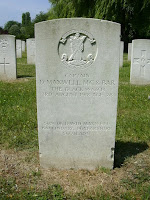 |
| David's Headstone in Senlis |
It is small consolation that David Jr. was
able to visit his home and receive his well-deserved accolades, for three
months later was he shot in the chest.
His died of his injuries two days after he was shot, on August 3, 1918. David Maxwell, Captain on the Black Watch, is
buried in Senlis French National Cemetery in Oise, France.
The Evening
Telegraph and Post, Dundee reported on Tuesday August 6, 1918 that Captain
Maxwell died of his wounds:
A
War Office telegram was received by Mr Maxwell yesterday evening stating that
his son had been seriously wounded in the chest. A later wire communicated the news that he
had succumbed to his injuries on Saturday night.
Maxwell Memorial in Padanaram, Scotland
 There is no doubt that David Maxwell Sr.
was heartbroken at the loss of his second son, and with no surviving children
needed an outlet for his grief and a way to properly memorialize his only
children. Padanaram (also known as “Paddy”
to the locals) is a small residential village between Forfar and Kirriemuir. It is near the town of Glamis, birthplace of
at least one of David’s sons. There,
visible from the A926, lies the Village Hall, which is a memorial to David and
John Rennie Maxwell. Inside the Memorial
Hall hang their photos, and outside there is a plaque which reads:
There is no doubt that David Maxwell Sr.
was heartbroken at the loss of his second son, and with no surviving children
needed an outlet for his grief and a way to properly memorialize his only
children. Padanaram (also known as “Paddy”
to the locals) is a small residential village between Forfar and Kirriemuir. It is near the town of Glamis, birthplace of
at least one of David’s sons. There,
visible from the A926, lies the Village Hall, which is a memorial to David and
John Rennie Maxwell. Inside the Memorial
Hall hang their photos, and outside there is a plaque which reads:
This hall is erected by
David Maxwell, Ballindarg
in memory of his two sons
Capt. David Maxwell, M.C. bar
Cpl. John Rennie Maxwell
Who Fell in the Great War
1914-1919
While the hall had fallen into some
disrepair, it has reportedly recently been renovated. The large glass window in the front facing
the road is flanked by the portraits of the Maxwell boys.
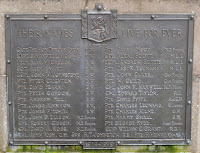
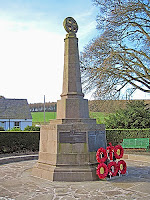 Not too far down the road in Glamis sits
another memorial to World War I fallen.
The Maxwell brothers are named on that plaque along with the others from
the area who lost their lives.
Not too far down the road in Glamis sits
another memorial to World War I fallen.
The Maxwell brothers are named on that plaque along with the others from
the area who lost their lives.
David Sr. had no other children and no
descendants to keep his sons in their memories.
I imagine this is why he built a village memorial hall in Padanaram so
their names and sacrifice would be remembered by generations a century after
their death in faraway fields of war. I
am honoured to be part of keeping that memory alive this Remembrance Day, November
11, 2018 – 100 years after the conclusion of the War to End All Wars.

